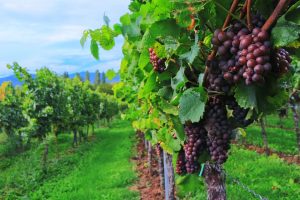Winemaking has been practiced for thousands of years. It is a natural process that requires minimal human intervention. Ask different winemakers how they come up with a product, and their answers will all likely be a little different.

(Pixabay / koreafreund)
Winemaking is a long process that can’t be rushed. It starts with the harvest. Grapes contain acids, tannins, and esters that are needed to make a natural and stable finished product. The tannins in the grapes provide the textural elements that make the wine bitter and dry. The timing of the harvesting determines the sweetness, acidity, and flavor of the wine. Determining the time of harvest is a combination of science and experience. Harvesting can be done mechanically, but many growers prefer manual harvesting to spare the vineyard from damage.
After the harvest, the grapes are brought to the winery and are de-stemmed and crushed. In ancient times, people stomped on the grapes with their feet. For a number of reasons, not the least of which is sanitation, modern wineries have abandoned the foot stomping for mechanical presses. For white wine, grapes must be pressed quickly in order to separate the juice from the solids. This prevents the tannins and the skin’s color from mixing into the wine. For red wine, the juice is left in contact with the skin for flavor and color.
The juice produced from pressing the grapes should begin fermenting within a few hours. Adding yeast will hasten the process and produce a more consistent result. Fermentation will continue until all the sugar content is converted into alcohol, producing dry wine.
Next comes the process of removing solids such as tannins, dead yeast, and proteins from the wine. Clarification can be achieved through filtration or fining. Fining involves adding a substance such as clay to the wine to clarify it. Unwanted particles will stick to the clay. Filtration involves the use of filters to capture the larger particles in the wine. The clarified wine will be transferred to another vessel in preparation for either aging or bottling.
Bottling is the final stages in the winemaking process. The wine can be bottled immediately or subjected to additional aging before bottling.